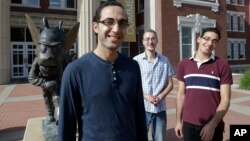British universities including Oxford, the oldest in the country, are opening their doors to academics fleeing Syria's civil war, expecting an exchange of ideas based on their research and experiences that will benefit both sides.
Academics have been directly targeted by Islamic State, the militant Sunni group that controls large swathes of Iraq and Syria and killed three staff of Iraq's Mosul University last month, according to a London-based charity.
Life is extremely difficult for scholars in the region, attacked by Islamic State and other militant rebel groups and suffering poverty and frequent bombing by government forces, according to the Council for At-Risk Academics (Cara) which is trying to help some of them leave.
Cara has been working with some of Oxford University's 38 colleges and more than 100 other British universities to place academics fleeing war and persecution in new jobs.
"People coming over always bring with them their own experiences," Cara executive director Stephen Wordsworth said in an interview with the Thomson Reuters Foundation. "It helps to encourage new ideas and new thinking."
Some two thirds of the 140 Middle East academics seeking Cara's help at present are Syrians - a few of whom have been accepted by Oxford colleges - and many of the rest are Iraqis. Recent arrivals have asked not to be named to protect families back home.
More than 250,000 people have been killed in Syria's civil war, which began in 2011. Islamic State seized Iraq's second city, Mosul, in June 2014 and now controls large parts of both Iraq and Syria.
Cara expects academics who come to Britain to return home when it is safe to do so, Wordsworth said. They will not be refugees but will have visas as visiting academics, with costs split between the host university and Cara.
Academics may be able to discuss their experiences with students of politics or human rights and with staff, improving their understanding of the Syrian crisis, he said.
German physicist Albert Einstein was taken on by Christ Church, Oxford in the 1930s, at a time when Jewish academics faced persecution by the Nazis.
In the 1950s Merton College, which has been working with Cara over the past year, took in Hungarian chemist George Radda when he fled the repression that followed his country's failed uprising against Soviet rule.
"[Visiting academics] bring their scholarship and their research talents, for us this is not simply an act of charity," Merton spokesman Simon Cope told the Thomson Reuters Foundation.
"They come and they contribute, and we see this very much as something from which we stand to gain."
Oxford traces its history to the 11th century and boasts British Prime Minister David Cameron and former U.S. President Bill Clinton as alumni.
Cameron announced last month that 20,000 Syrian refugees would be admitted to Britain over the next five years, a big increase on existing levels but far fewer than the number being accepted by leading European nations Sweden and Germany.





